Site Reliability Engineer Resume Examples

Jul 18, 2024
|
12 min read
Crafting a standout site reliability engineer resume: Ensure your application doesn't fail over. Learn how to highlight your skills, experience, and achievements to stand out in this high-demand field.
Rated by 348 people
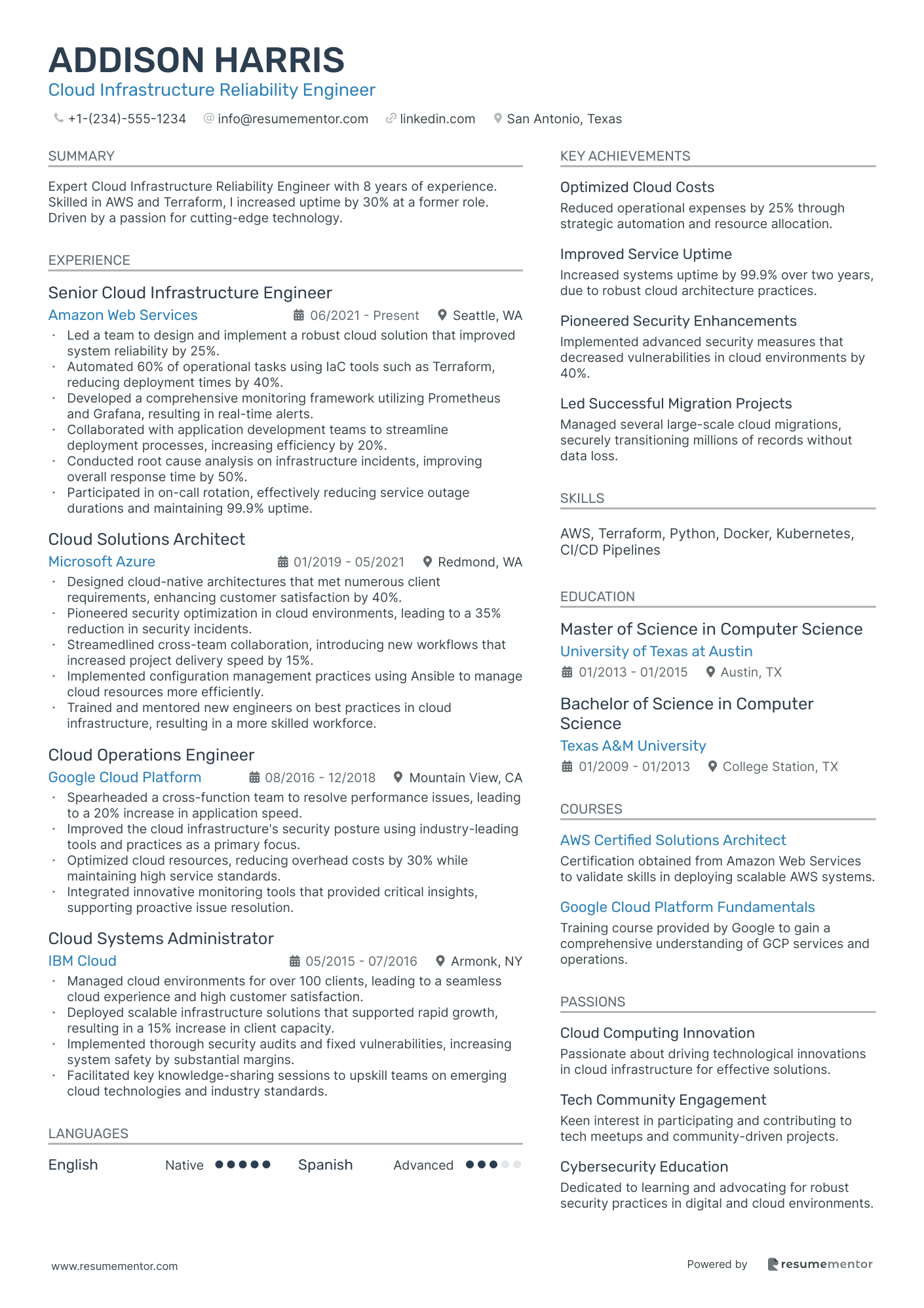
Cloud Infrastructure Reliability Engineer
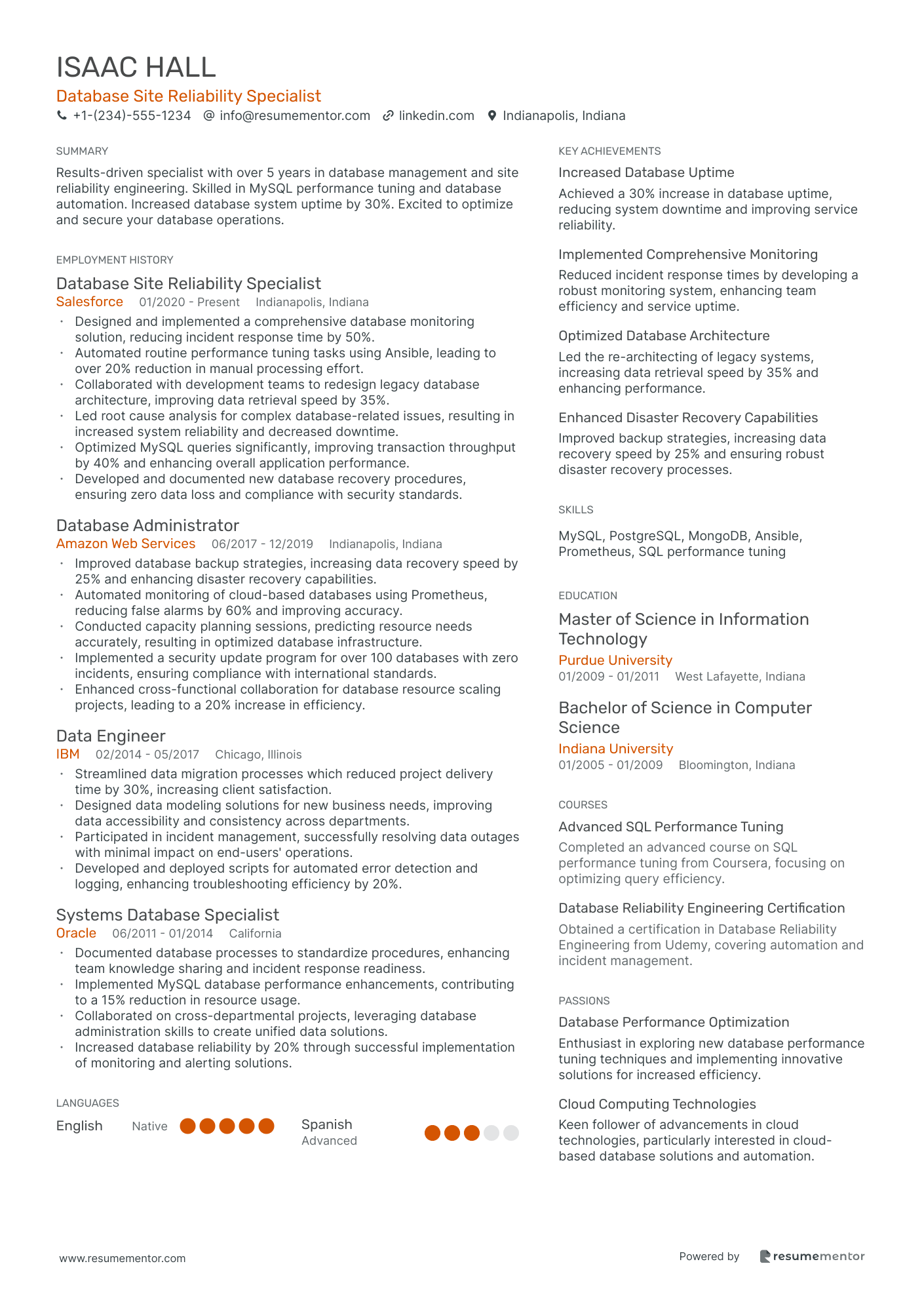
Database Site Reliability Specialist
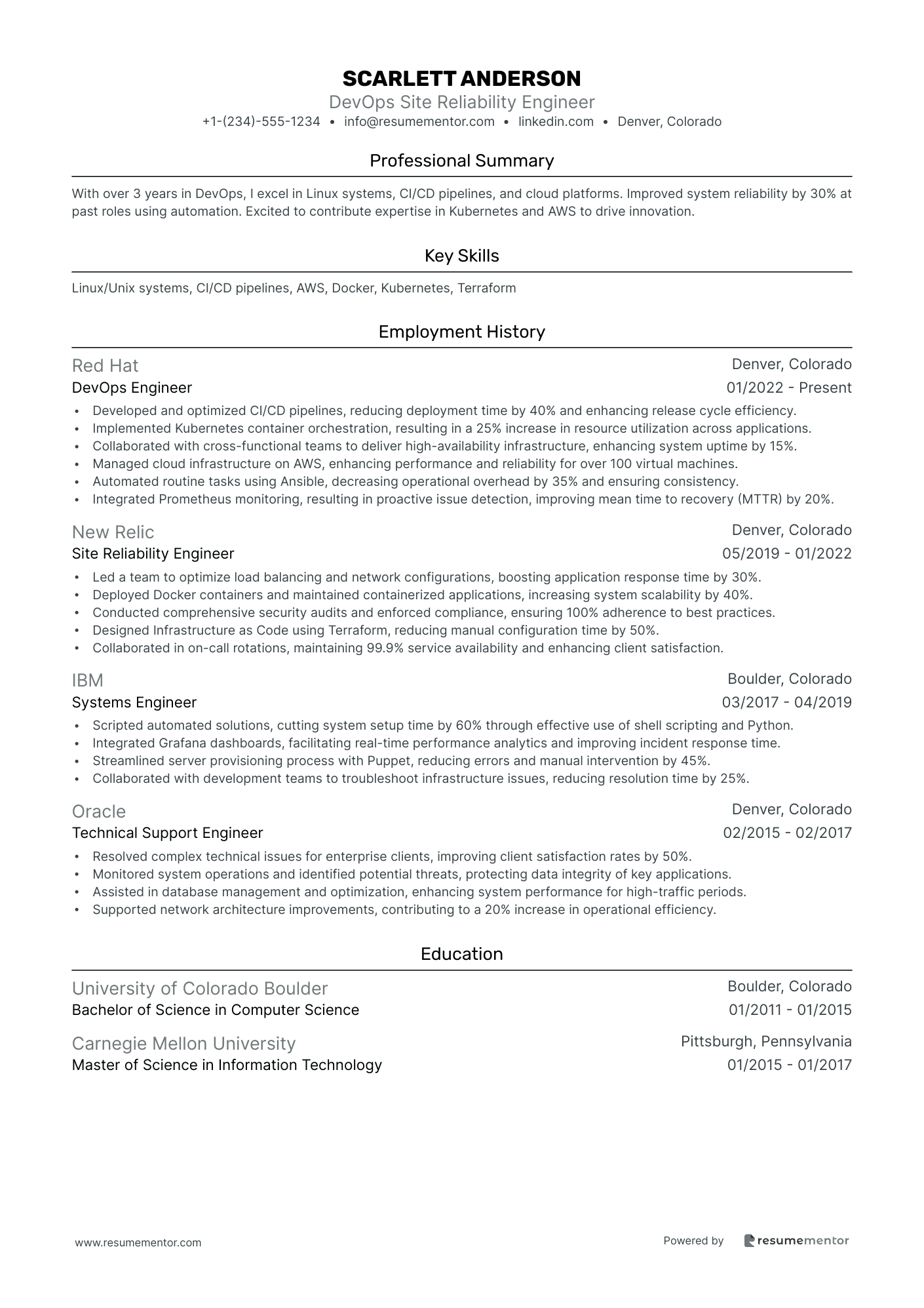
DevOps Site Reliability Engineer
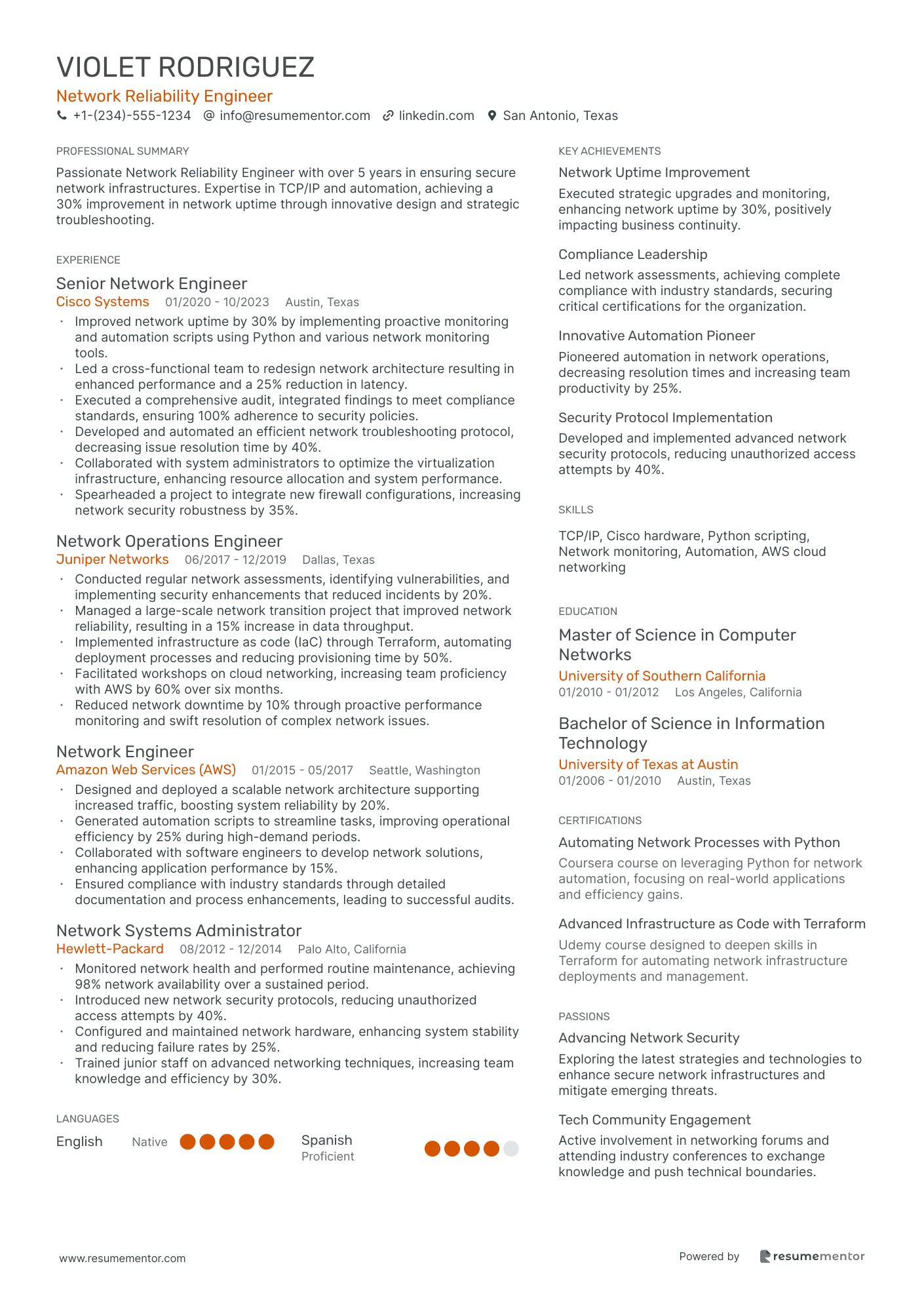
Network Reliability Engineer
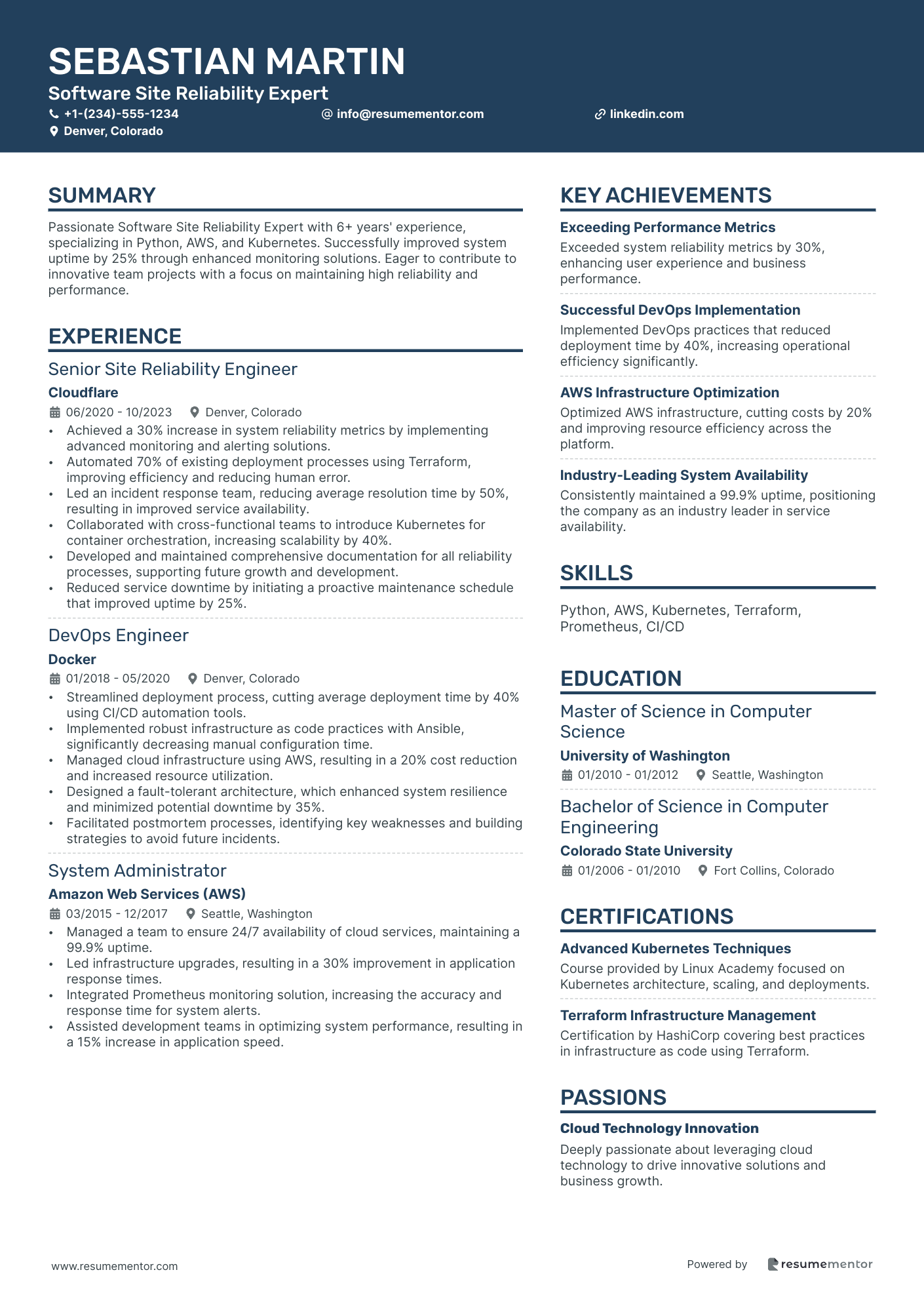
Software Site Reliability Expert
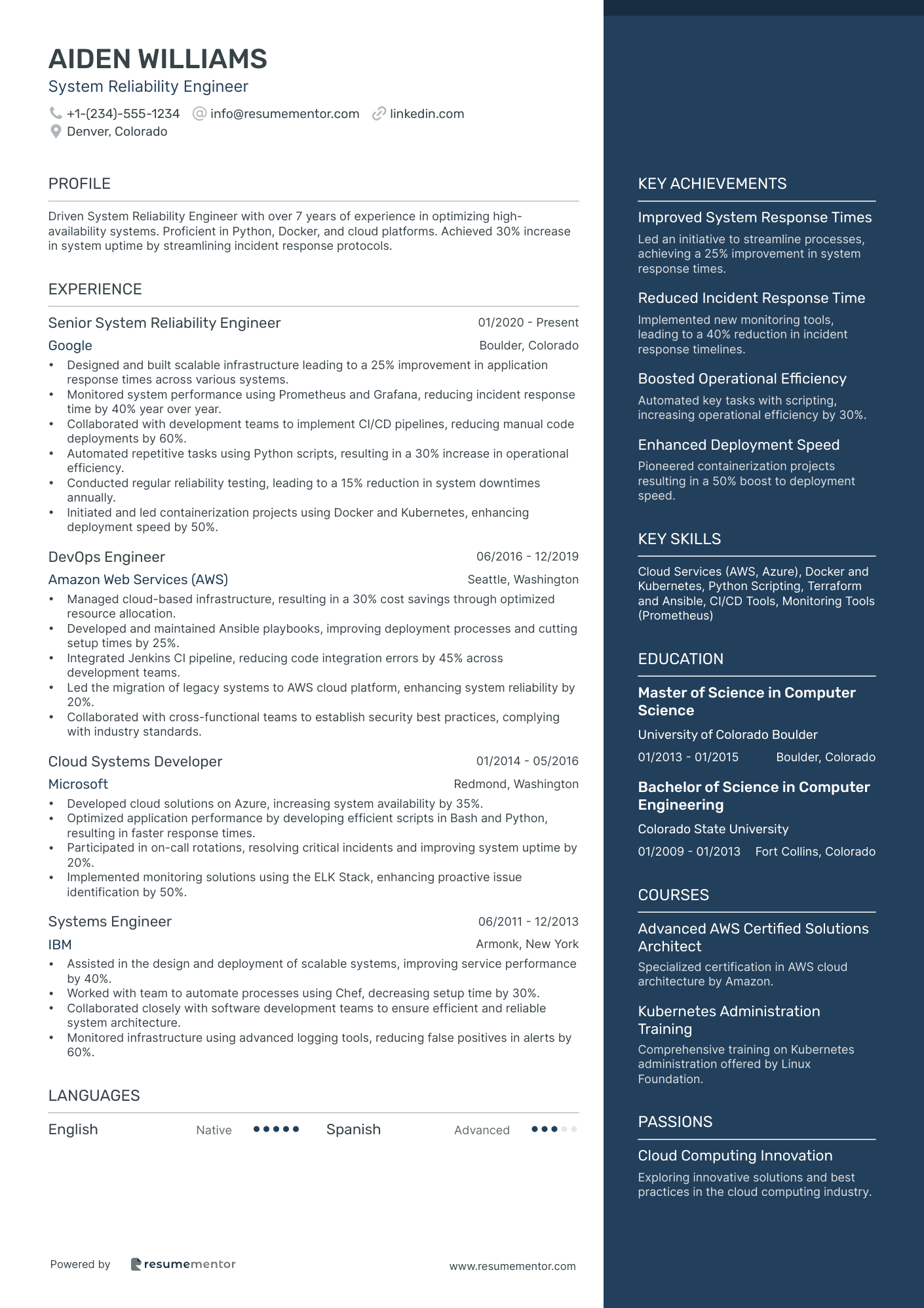
System Reliability Engineer
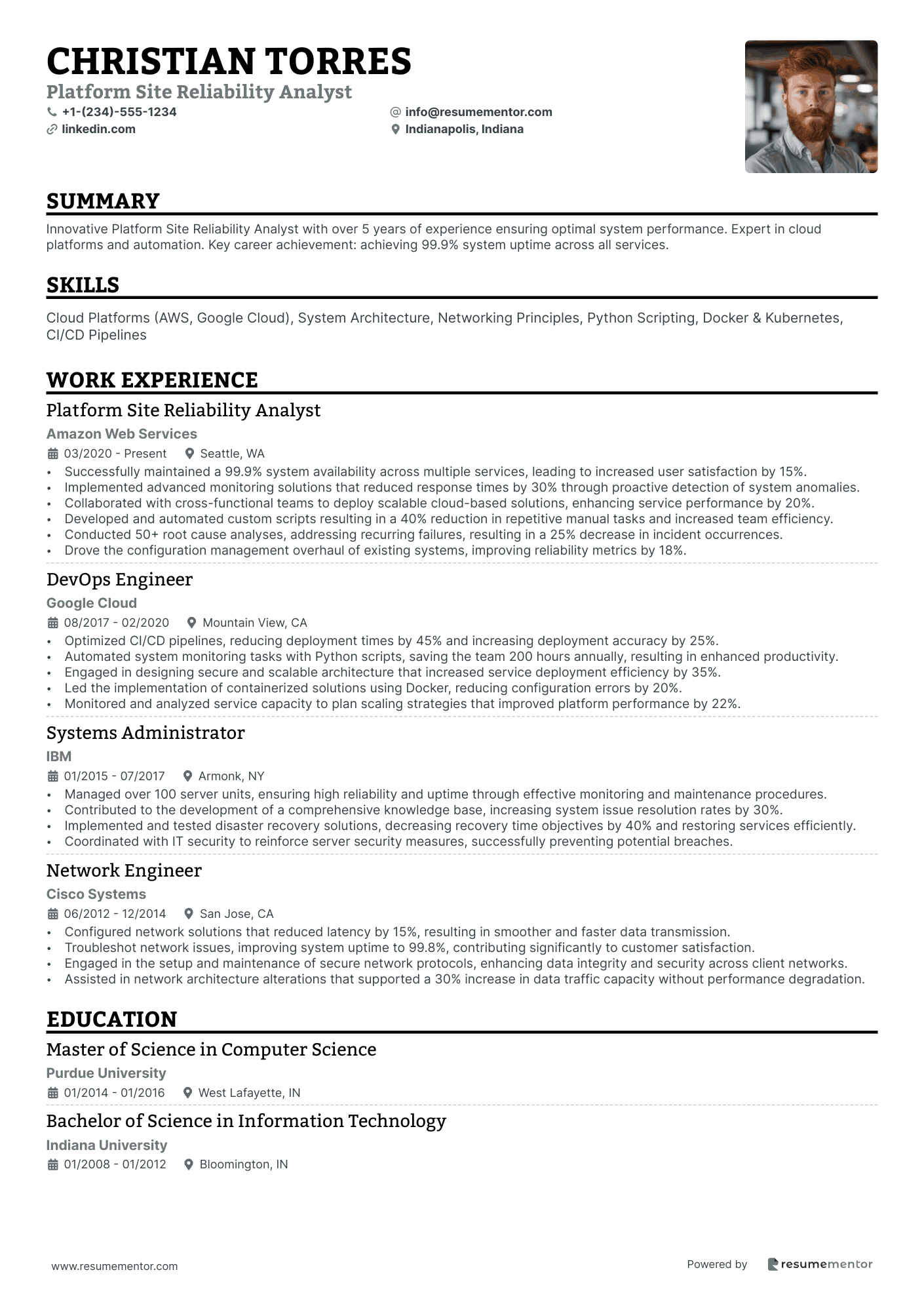
Platform Site Reliability Analyst
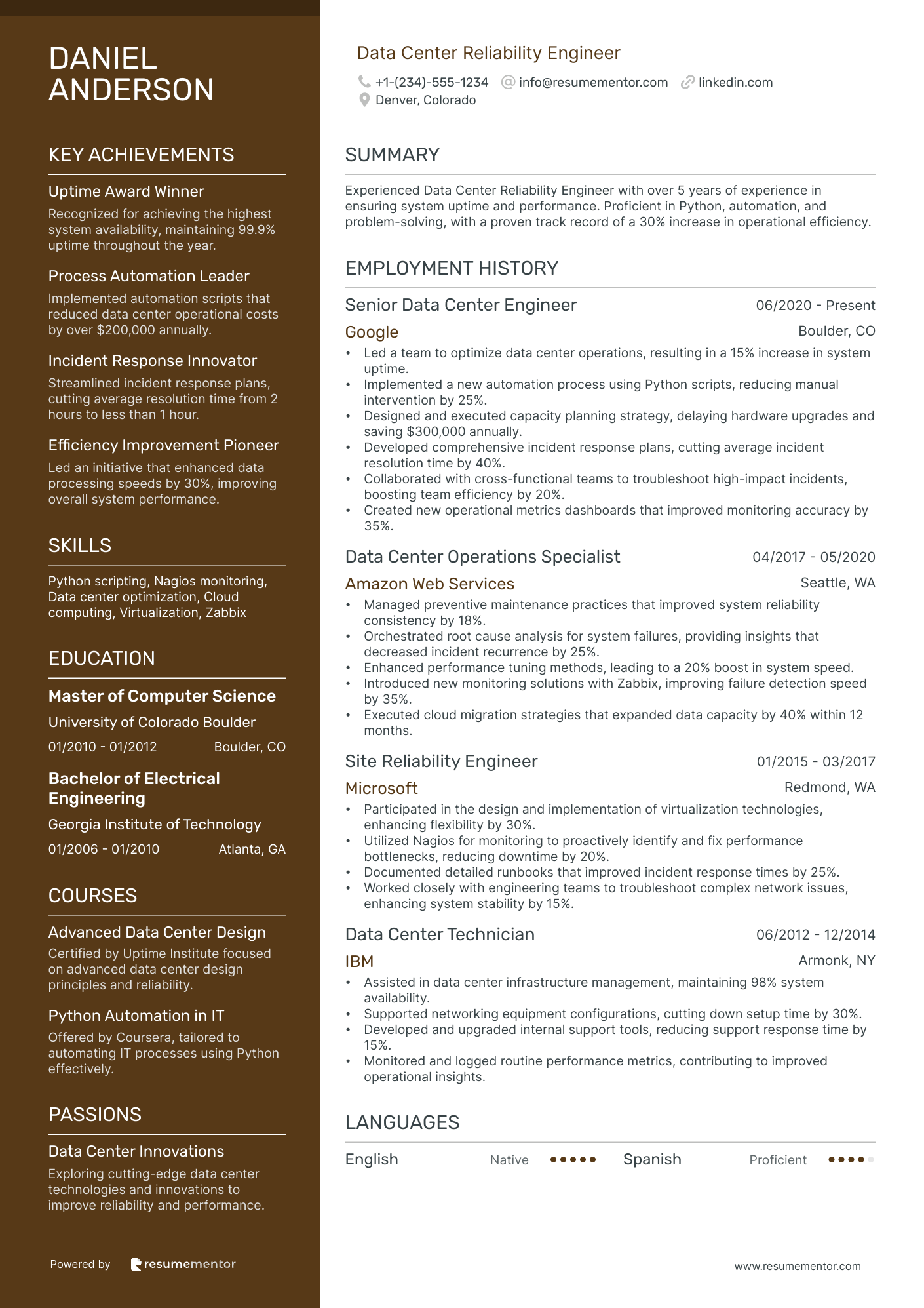
Data Center Reliability Engineer
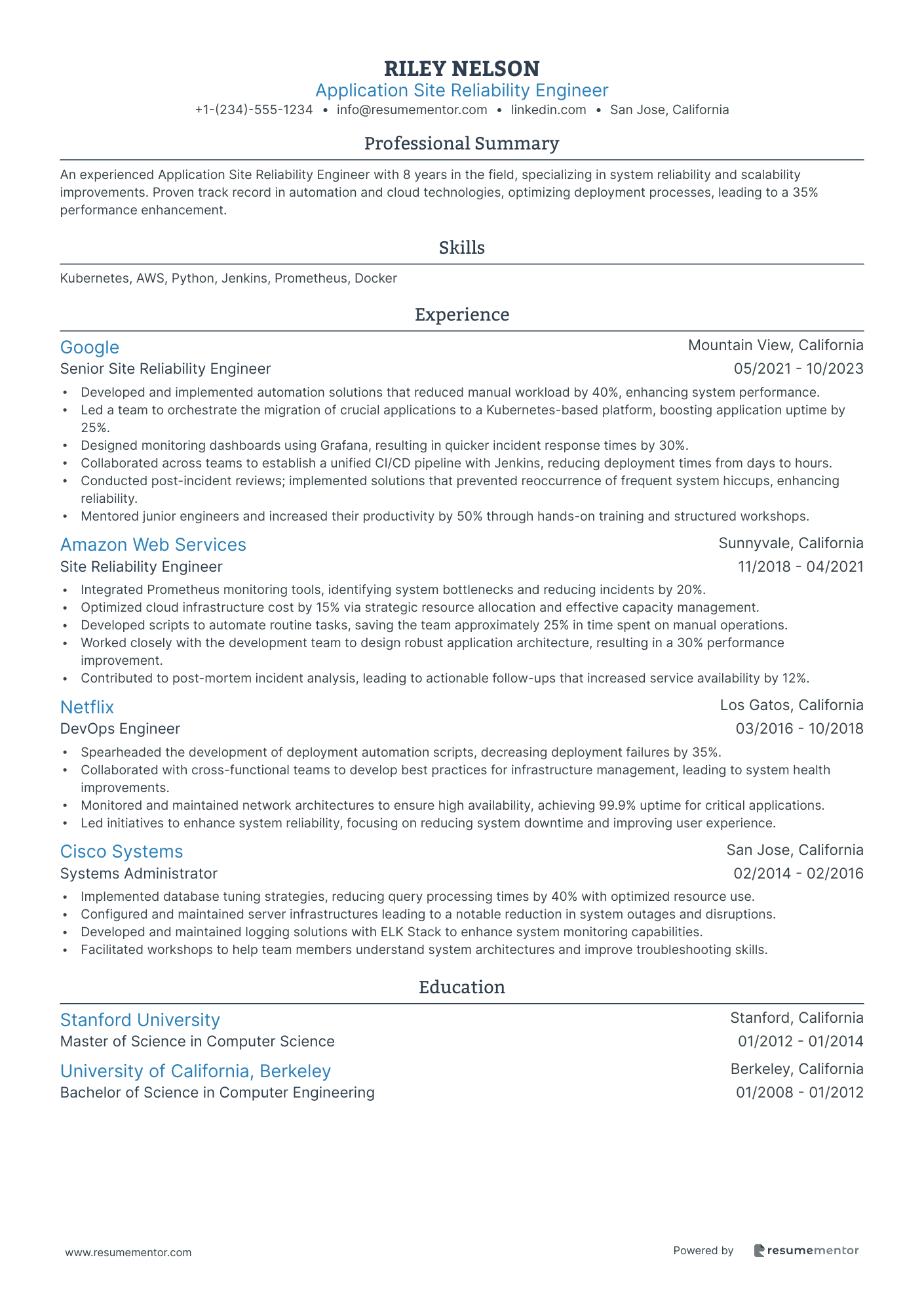
Application Site Reliability Engineer
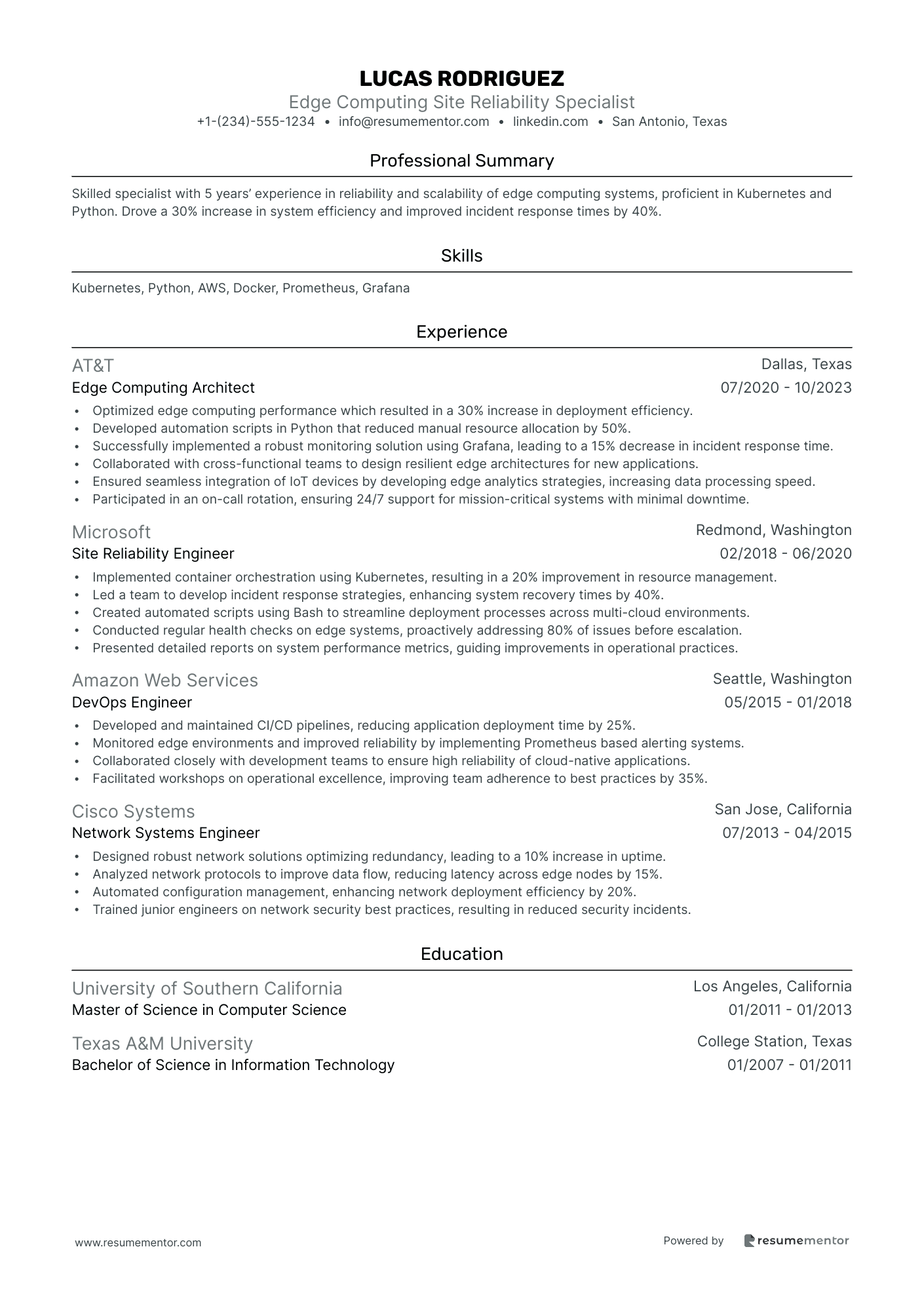
Edge Computing Site Reliability Specialist

Cloud Infrastructure Reliability Engineer resume sample
- •Led a team to design and implement a robust cloud solution that improved system reliability by 25%.
- •Automated 60% of operational tasks using IaC tools such as Terraform, reducing deployment times by 40%.
- •Developed a comprehensive monitoring framework utilizing Prometheus and Grafana, resulting in real-time alerts.
- •Collaborated with application development teams to streamline deployment processes, increasing efficiency by 20%.
- •Conducted root cause analysis on infrastructure incidents, improving overall response time by 50%.
- •Participated in on-call rotation, effectively reducing service outage durations and maintaining 99.9% uptime.
- •Designed cloud-native architectures that met numerous client requirements, enhancing customer satisfaction by 40%.
- •Pioneered security optimization in cloud environments, leading to a 35% reduction in security incidents.
- •Streamedlined cross-team collaboration, introducing new workflows that increased project delivery speed by 15%.
- •Implemented configuration management practices using Ansible to manage cloud resources more efficiently.
- •Trained and mentored new engineers on best practices in cloud infrastructure, resulting in a more skilled workforce.
- •Spearheaded a cross-function team to resolve performance issues, leading to a 20% increase in application speed.
- •Improved the cloud infrastructure's security posture using industry-leading tools and practices as a primary focus.
- •Optimized cloud resources, reducing overhead costs by 30% while maintaining high service standards.
- •Integrated innovative monitoring tools that provided critical insights, supporting proactive issue resolution.
- •Managed cloud environments for over 100 clients, leading to a seamless cloud experience and high customer satisfaction.
- •Deployed scalable infrastructure solutions that supported rapid growth, resulting in a 15% increase in client capacity.
- •Implemented thorough security audits and fixed vulnerabilities, increasing system safety by substantial margins.
- •Facilitated key knowledge-sharing sessions to upskill teams on emerging cloud technologies and industry standards.
Database Site Reliability Specialist resume sample
- •Designed and implemented a comprehensive database monitoring solution, reducing incident response time by 50%.
- •Automated routine performance tuning tasks using Ansible, leading to over 20% reduction in manual processing effort.
- •Collaborated with development teams to redesign legacy database architecture, improving data retrieval speed by 35%.
- •Led root cause analysis for complex database-related issues, resulting in increased system reliability and decreased downtime.
- •Optimized MySQL queries significantly, improving transaction throughput by 40% and enhancing overall application performance.
- •Developed and documented new database recovery procedures, ensuring zero data loss and compliance with security standards.
- •Improved database backup strategies, increasing data recovery speed by 25% and enhancing disaster recovery capabilities.
- •Automated monitoring of cloud-based databases using Prometheus, reducing false alarms by 60% and improving accuracy.
- •Conducted capacity planning sessions, predicting resource needs accurately, resulting in optimized database infrastructure.
- •Implemented a security update program for over 100 databases with zero incidents, ensuring compliance with international standards.
- •Enhanced cross-functional collaboration for database resource scaling projects, leading to a 20% increase in efficiency.
- •Streamlined data migration processes which reduced project delivery time by 30%, increasing client satisfaction.
- •Designed data modeling solutions for new business needs, improving data accessibility and consistency across departments.
- •Participated in incident management, successfully resolving data outages with minimal impact on end-users' operations.
- •Developed and deployed scripts for automated error detection and logging, enhancing troubleshooting efficiency by 20%.
- •Documented database processes to standardize procedures, enhancing team knowledge sharing and incident response readiness.
- •Implemented MySQL database performance enhancements, contributing to a 15% reduction in resource usage.
- •Collaborated on cross-departmental projects, leveraging database administration skills to create unified data solutions.
- •Increased database reliability by 20% through successful implementation of monitoring and alerting solutions.
DevOps Site Reliability Engineer resume sample
- •Developed and optimized CI/CD pipelines, reducing deployment time by 40% and enhancing release cycle efficiency.
- •Implemented Kubernetes container orchestration, resulting in a 25% increase in resource utilization across applications.
- •Collaborated with cross-functional teams to deliver high-availability infrastructure, enhancing system uptime by 15%.
- •Managed cloud infrastructure on AWS, enhancing performance and reliability for over 100 virtual machines.
- •Automated routine tasks using Ansible, decreasing operational overhead by 35% and ensuring consistency.
- •Integrated Prometheus monitoring, resulting in proactive issue detection, improving mean time to recovery (MTTR) by 20%.
- •Led a team to optimize load balancing and network configurations, boosting application response time by 30%.
- •Deployed Docker containers and maintained containerized applications, increasing system scalability by 40%.
- •Conducted comprehensive security audits and enforced compliance, ensuring 100% adherence to best practices.
- •Designed Infrastructure as Code using Terraform, reducing manual configuration time by 50%.
- •Collaborated in on-call rotations, maintaining 99.9% service availability and enhancing client satisfaction.
- •Scripted automated solutions, cutting system setup time by 60% through effective use of shell scripting and Python.
- •Integrated Grafana dashboards, facilitating real-time performance analytics and improving incident response time.
- •Streamlined server provisioning process with Puppet, reducing errors and manual intervention by 45%.
- •Collaborated with development teams to troubleshoot infrastructure issues, reducing resolution time by 25%.
- •Resolved complex technical issues for enterprise clients, improving client satisfaction rates by 50%.
- •Monitored system operations and identified potential threats, protecting data integrity of key applications.
- •Assisted in database management and optimization, enhancing system performance for high-traffic periods.
- •Supported network architecture improvements, contributing to a 20% increase in operational efficiency.
Network Reliability Engineer resume sample
- •Improved network uptime by 30% by implementing proactive monitoring and automation scripts using Python and various network monitoring tools.
- •Led a cross-functional team to redesign network architecture resulting in enhanced performance and a 25% reduction in latency.
- •Executed a comprehensive audit, integrated findings to meet compliance standards, ensuring 100% adherence to security policies.
- •Developed and automated an efficient network troubleshooting protocol, decreasing issue resolution time by 40%.
- •Collaborated with system administrators to optimize the virtualization infrastructure, enhancing resource allocation and system performance.
- •Spearheaded a project to integrate new firewall configurations, increasing network security robustness by 35%.
- •Conducted regular network assessments, identifying vulnerabilities, and implementing security enhancements that reduced incidents by 20%.
- •Managed a large-scale network transition project that improved network reliability, resulting in a 15% increase in data throughput.
- •Implemented infrastructure as code (IaC) through Terraform, automating deployment processes and reducing provisioning time by 50%.
- •Facilitated workshops on cloud networking, increasing team proficiency with AWS by 60% over six months.
- •Reduced network downtime by 10% through proactive performance monitoring and swift resolution of complex network issues.
- •Designed and deployed a scalable network architecture supporting increased traffic, boosting system reliability by 20%.
- •Generated automation scripts to streamline tasks, improving operational efficiency by 25% during high-demand periods.
- •Collaborated with software engineers to develop network solutions, enhancing application performance by 15%.
- •Ensured compliance with industry standards through detailed documentation and process enhancements, leading to successful audits.
- •Monitored network health and performed routine maintenance, achieving 98% network availability over a sustained period.
- •Introduced new network security protocols, reducing unauthorized access attempts by 40%.
- •Configured and maintained network hardware, enhancing system stability and reducing failure rates by 25%.
- •Trained junior staff on advanced networking techniques, increasing team knowledge and efficiency by 30%.
Software Site Reliability Expert resume sample
- •Achieved a 30% increase in system reliability metrics by implementing advanced monitoring and alerting solutions.
- •Automated 70% of existing deployment processes using Terraform, improving efficiency and reducing human error.
- •Led an incident response team, reducing average resolution time by 50%, resulting in improved service availability.
- •Collaborated with cross-functional teams to introduce Kubernetes for container orchestration, increasing scalability by 40%.
- •Developed and maintained comprehensive documentation for all reliability processes, supporting future growth and development.
- •Reduced service downtime by initiating a proactive maintenance schedule that improved uptime by 25%.
- •Streamlined deployment process, cutting average deployment time by 40% using CI/CD automation tools.
- •Implemented robust infrastructure as code practices with Ansible, significantly decreasing manual configuration time.
- •Managed cloud infrastructure using AWS, resulting in a 20% cost reduction and increased resource utilization.
- •Designed a fault-tolerant architecture, which enhanced system resilience and minimized potential downtime by 35%.
- •Facilitated postmortem processes, identifying key weaknesses and building strategies to avoid future incidents.
- •Managed a team to ensure 24/7 availability of cloud services, maintaining a 99.9% uptime.
- •Led infrastructure upgrades, resulting in a 30% improvement in application response times.
- •Integrated Prometheus monitoring solution, increasing the accuracy and response time for system alerts.
- •Assisted development teams in optimizing system performance, resulting in a 15% increase in application speed.
- •Developed and maintained backend services, improving processing speed by 20% through code optimization.
- •Devised testing frameworks, decreasing bug incidence by 50% and enhancing code reliability.
- •Collaborated with product teams to meet quarterly objectives, enhancing cross-department communication and delivery.
- •Implemented essential software updates, reducing security vulnerabilities by 40% and ensuring data protection.
System Reliability Engineer resume sample
- •Designed and built scalable infrastructure leading to a 25% improvement in application response times across various systems.
- •Monitored system performance using Prometheus and Grafana, reducing incident response time by 40% year over year.
- •Collaborated with development teams to implement CI/CD pipelines, reducing manual code deployments by 60%.
- •Automated repetitive tasks using Python scripts, resulting in a 30% increase in operational efficiency.
- •Conducted regular reliability testing, leading to a 15% reduction in system downtimes annually.
- •Initiated and led containerization projects using Docker and Kubernetes, enhancing deployment speed by 50%.
- •Managed cloud-based infrastructure, resulting in a 30% cost savings through optimized resource allocation.
- •Developed and maintained Ansible playbooks, improving deployment processes and cutting setup times by 25%.
- •Integrated Jenkins CI pipeline, reducing code integration errors by 45% across development teams.
- •Led the migration of legacy systems to AWS cloud platform, enhancing system reliability by 20%.
- •Collaborated with cross-functional teams to establish security best practices, complying with industry standards.
- •Developed cloud solutions on Azure, increasing system availability by 35%.
- •Optimized application performance by developing efficient scripts in Bash and Python, resulting in faster response times.
- •Participated in on-call rotations, resolving critical incidents and improving system uptime by 20%.
- •Implemented monitoring solutions using the ELK Stack, enhancing proactive issue identification by 50%.
- •Assisted in the design and deployment of scalable systems, improving service performance by 40%.
- •Worked with team to automate processes using Chef, decreasing setup time by 30%.
- •Collaborated closely with software development teams to ensure efficient and reliable system architecture.
- •Monitored infrastructure using advanced logging tools, reducing false positives in alerts by 60%.
Platform Site Reliability Analyst resume sample
- •Successfully maintained a 99.9% system availability across multiple services, leading to increased user satisfaction by 15%.
- •Implemented advanced monitoring solutions that reduced response times by 30% through proactive detection of system anomalies.
- •Collaborated with cross-functional teams to deploy scalable cloud-based solutions, enhancing service performance by 20%.
- •Developed and automated custom scripts resulting in a 40% reduction in repetitive manual tasks and increased team efficiency.
- •Conducted 50+ root cause analyses, addressing recurring failures, resulting in a 25% decrease in incident occurrences.
- •Drove the configuration management overhaul of existing systems, improving reliability metrics by 18%.
- •Optimized CI/CD pipelines, reducing deployment times by 45% and increasing deployment accuracy by 25%.
- •Automated system monitoring tasks with Python scripts, saving the team 200 hours annually, resulting in enhanced productivity.
- •Engaged in designing secure and scalable architecture that increased service deployment efficiency by 35%.
- •Led the implementation of containerized solutions using Docker, reducing configuration errors by 20%.
- •Monitored and analyzed service capacity to plan scaling strategies that improved platform performance by 22%.
- •Managed over 100 server units, ensuring high reliability and uptime through effective monitoring and maintenance procedures.
- •Contributed to the development of a comprehensive knowledge base, increasing system issue resolution rates by 30%.
- •Implemented and tested disaster recovery solutions, decreasing recovery time objectives by 40% and restoring services efficiently.
- •Coordinated with IT security to reinforce server security measures, successfully preventing potential breaches.
- •Configured network solutions that reduced latency by 15%, resulting in smoother and faster data transmission.
- •Troubleshot network issues, improving system uptime to 99.8%, contributing significantly to customer satisfaction.
- •Engaged in the setup and maintenance of secure network protocols, enhancing data integrity and security across client networks.
- •Assisted in network architecture alterations that supported a 30% increase in data traffic capacity without performance degradation.
Data Center Reliability Engineer resume sample
- •Led a team to optimize data center operations, resulting in a 15% increase in system uptime.
- •Implemented a new automation process using Python scripts, reducing manual intervention by 25%.
- •Designed and executed capacity planning strategy, delaying hardware upgrades and saving $300,000 annually.
- •Developed comprehensive incident response plans, cutting average incident resolution time by 40%.
- •Collaborated with cross-functional teams to troubleshoot high-impact incidents, boosting team efficiency by 20%.
- •Created new operational metrics dashboards that improved monitoring accuracy by 35%.
- •Managed preventive maintenance practices that improved system reliability consistency by 18%.
- •Orchestrated root cause analysis for system failures, providing insights that decreased incident recurrence by 25%.
- •Enhanced performance tuning methods, leading to a 20% boost in system speed.
- •Introduced new monitoring solutions with Zabbix, improving failure detection speed by 35%.
- •Executed cloud migration strategies that expanded data capacity by 40% within 12 months.
- •Participated in the design and implementation of virtualization technologies, enhancing flexibility by 30%.
- •Utilized Nagios for monitoring to proactively identify and fix performance bottlenecks, reducing downtime by 20%.
- •Documented detailed runbooks that improved incident response times by 25%.
- •Worked closely with engineering teams to troubleshoot complex network issues, enhancing system stability by 15%.
- •Assisted in data center infrastructure management, maintaining 98% system availability.
- •Supported networking equipment configurations, cutting down setup time by 30%.
- •Developed and upgraded internal support tools, reducing support response time by 15%.
- •Monitored and logged routine performance metrics, contributing to improved operational insights.
Application Site Reliability Engineer resume sample
- •Developed and implemented automation solutions that reduced manual workload by 40%, enhancing system performance.
- •Led a team to orchestrate the migration of crucial applications to a Kubernetes-based platform, boosting application uptime by 25%.
- •Designed monitoring dashboards using Grafana, resulting in quicker incident response times by 30%.
- •Collaborated across teams to establish a unified CI/CD pipeline with Jenkins, reducing deployment times from days to hours.
- •Conducted post-incident reviews; implemented solutions that prevented reoccurrence of frequent system hiccups, enhancing reliability.
- •Mentored junior engineers and increased their productivity by 50% through hands-on training and structured workshops.
- •Integrated Prometheus monitoring tools, identifying system bottlenecks and reducing incidents by 20%.
- •Optimized cloud infrastructure cost by 15% via strategic resource allocation and effective capacity management.
- •Developed scripts to automate routine tasks, saving the team approximately 25% in time spent on manual operations.
- •Worked closely with the development team to design robust application architecture, resulting in a 30% performance improvement.
- •Contributed to post-mortem incident analysis, leading to actionable follow-ups that increased service availability by 12%.
- •Spearheaded the development of deployment automation scripts, decreasing deployment failures by 35%.
- •Collaborated with cross-functional teams to develop best practices for infrastructure management, leading to system health improvements.
- •Monitored and maintained network architectures to ensure high availability, achieving 99.9% uptime for critical applications.
- •Led initiatives to enhance system reliability, focusing on reducing system downtime and improving user experience.
- •Implemented database tuning strategies, reducing query processing times by 40% with optimized resource use.
- •Configured and maintained server infrastructures leading to a notable reduction in system outages and disruptions.
- •Developed and maintained logging solutions with ELK Stack to enhance system monitoring capabilities.
- •Facilitated workshops to help team members understand system architectures and improve troubleshooting skills.
Edge Computing Site Reliability Specialist resume sample
- •Optimized edge computing performance which resulted in a 30% increase in deployment efficiency.
- •Developed automation scripts in Python that reduced manual resource allocation by 50%.
- •Successfully implemented a robust monitoring solution using Grafana, leading to a 15% decrease in incident response time.
- •Collaborated with cross-functional teams to design resilient edge architectures for new applications.
- •Ensured seamless integration of IoT devices by developing edge analytics strategies, increasing data processing speed.
- •Participated in an on-call rotation, ensuring 24/7 support for mission-critical systems with minimal downtime.
- •Implemented container orchestration using Kubernetes, resulting in a 20% improvement in resource management.
- •Led a team to develop incident response strategies, enhancing system recovery times by 40%.
- •Created automated scripts using Bash to streamline deployment processes across multi-cloud environments.
- •Conducted regular health checks on edge systems, proactively addressing 80% of issues before escalation.
- •Presented detailed reports on system performance metrics, guiding improvements in operational practices.
- •Developed and maintained CI/CD pipelines, reducing application deployment time by 25%.
- •Monitored edge environments and improved reliability by implementing Prometheus based alerting systems.
- •Collaborated closely with development teams to ensure high reliability of cloud-native applications.
- •Facilitated workshops on operational excellence, improving team adherence to best practices by 35%.
- •Designed robust network solutions optimizing redundancy, leading to a 10% increase in uptime.
- •Analyzed network protocols to improve data flow, reducing latency across edge nodes by 15%.
- •Automated configuration management, enhancing network deployment efficiency by 20%.
- •Trained junior engineers on network security best practices, resulting in reduced security incidents.
As a site reliability engineer, you're the glue holding complex systems together, ensuring everything runs smoothly even when chaos strikes. However, translating your technical expertise into a resume can feel like managing an unpredictable server—challenging and intricate. You know your skills are crucial, but capturing that on paper can be tricky.
A well-crafted resume not only highlights your skills but also showcases your ability to maintain resilient and efficient systems. Many site reliability engineers find it tough to condense their technical work into a document that stands out. This is where using structured resume templates can streamline the process, offering a clear layout to make your qualifications shine.
Finding the right balance between technical language and plain terms is crucial. Your resume should appeal to both technical and non-technical audiences, ensuring your accomplishments resonate broadly. A well-curated resume can serve as your golden ticket in a competitive job market.
Think of your resume as a tool to open doors and initiate meaningful conversations. With the right structure, you can transform your detailed experiences into a compelling narrative. Let’s dive into crafting a resume that truly captures your technical prowess and adaptability as a site reliability engineer.
Key Takeaways
- A site reliability engineer resume should highlight expertise in system reliability, scalability, and performance optimization, showcasing the ability to manage complex infrastructure processes.
- Starting with a professional summary that conveys strategic impact and key achievements sets a strong foundation for a compelling resume.
- Technical skills, particularly in cloud computing, system automation, and specific technologies, should be emphasized to align with job requirements.
- A well-structured experience section with quantifiable achievements illustrates your role and impact in previous positions, making your qualifications clear to the hiring manager.
- Education and relevant certifications should be included to substantiate your technical foundation, with optional sections like languages or volunteer work adding personal depth to your resume.
What to focus on when writing your site reliability engineer resume
A site reliability engineer resume should effectively communicate your expertise in system reliability, scalability, and performance optimization to potential employers. It needs to showcase your ability to manage complex infrastructure, automate critical processes, and resolve challenging problems that impact system operations. Highlighting skills and achievements that demonstrate your capability to enhance both reliability and efficiency is crucial.
How to structure your site reliability engineer resume
- Professional Summary — Start with a concise overview of your experience in site reliability engineering. Your summary should convey your strategic impact and how you've driven improvements in system performance and reliability. Focus on key achievements and how your contributions have positively impacted previous projects, setting you apart from other candidates.
- Technical Skills — Clearly list your skills, emphasizing cloud computing, system automation, and monitoring tools, with expertise in technologies like Kubernetes, Docker, and Linux. It's essential to include scripting languages such as Python or Bash to demonstrate your ability to automate tasks and streamline operations. Tailor this section to align with the specific tools and technologies relevant to the target job, ensuring alignment with the job description.
- Work Experience — Detail your previous roles and responsibilities, focusing on accomplishments related to improving system performance and reliability. Highlight the infrastructure improvements you've implemented and the concrete results achieved. Incorporate specific examples that illustrate your problem-solving skills and your role in driving technological advancements within your team or organization.
- Education — Outline your educational background, emphasizing degrees or certifications in computer science or information technology that are directly relevant to your role as an SRE. Highlight any coursework or projects that equipped you with the skills needed for managing and optimizing complex systems. This provides a foundation for the technical skills and knowledge you bring to the role.
- Certifications — Include any relevant certifications that strengthen your credentials, like Certified Kubernetes Administrator (CKA) or AWS Certified Solutions Architect, to underscore your technical proficiency. These certifications demonstrate your commitment to professional growth and validate your expertise in critical technologies and methodologies specific to site reliability engineering.
- Projects — Discuss significant projects where you spearheaded enhancements in system reliability and efficiency. Use specific metrics to illustrate the positive impact of your efforts. Emphasize how these projects contributed to improved system performance, reduced downtime, or increased scalability, showcasing your ability to deliver tangible results and drive innovation in your field.
Together, the sections outlined here form a comprehensive blueprint for crafting your site reliability engineer resume. As we dive deeper below, each section will be expanded upon to provide more in-depth guidance and insights tailored to this specialized field.
Which resume format to choose
Your resume as a site reliability engineer should clearly highlight your technical expertise and experience. Using a reverse-chronological format is ideal for this field because it allows your most recent and relevant roles to take precedence, which is crucial in demonstrating your ability to handle the evolving challenges of site reliability.
Choosing the right font also plays a key role in making your resume stand out. Opt for Rubik, Lato, or Montserrat, as these fonts are clean and modern, aligning well with the technical nature of your job. They not only enhance readability but also convey a sense of professionalism and attention to detail, which are important traits in any engineering role.
Saving your resume as a PDF is a critical step. This ensures that your carefully crafted layout and designs remain consistent across different platforms and devices, making sure that hiring managers see your resume exactly as you intended.
Lastly, maintain consistent margins set at one inch on all sides. This approach provides ample white space, making your resume easy on the eyes. It also helps to create a sense of order and balance, which reflects well on your organizational skills—essential for any site reliability engineer. By thoughtfully considering each of these elements, your resume will effectively communicate your qualifications in a professional manner.
How to write a quantifiable resume experience section
A well-crafted experience section on a site reliability engineer resume highlights your essential role in maintaining seamless system operations. This section is crucial because it shows how your prior roles make you an ideal fit for the job you're eyeing. Emphasize your achievements with clear, quantifiable results, using strong action words, while aligning your resume to the job description. Start with your most recent positions and consider experience from the past 10-15 years if it adds value. Focus on job titles and responsibilities that align with your career goals, showcasing your expertise. To catch a hiring manager's attention, match your skills to the requirements in the job ad using action verbs like "enhanced," "managed," or "optimized" to demonstrate your influence effectively.
- •Reduced system downtime by 30% through strategic automation using Python scripts.
- •Improved incident response times by 40% with a new monitoring tool, saving $150K each year.
- •Led a team to enhance deployment processes, cutting deployment time in half.
- •Worked with the development team to streamline CI/CD pipelines, lowering bug frequency by 25%.
The experience section above shines because it effectively connects your impact to the company's success in previous roles. Each bullet point not only presents a clear achievement but also ties back to overall operational improvements. By including specific numbers like 30%, 40%, and $150K, you immediately underscore the tangible benefits of your actions, ensuring these achievements stand out. Strong verbs like "reduced," "improved," and "led" are strategically used to communicate your proactive role and leadership skills, seamlessly tying your achievements to the needs of the hiring company.
This section stands out by aligning your accomplishments with the primary objectives of a site reliability engineer. By focusing on reliability, automation, and teamwork, you're addressing the core aspects of the role, ensuring your suitability is apparent. The emphasis on collaboration and measurable outcomes guarantees that hiring managers can quickly appreciate how your expertise translates into their organizational needs. The concise yet effective structure highlights your impact clearly, making your experience both relatable and compelling.
Problem-Solving Focused resume experience section
A problem-solving-focused site reliability engineer resume experience section should emphasize your ability to effectively address challenges. Begin by stating the company and your role there to set the stage. Dive into the specific problems you faced, and paint a picture of how you tackled them with precision. Quantifying achievements like reduced downtime or enhanced system performance adds weight and clarity to your success stories, making your impact undeniable.
Each bullet point can become a thread that weaves into the larger narrative of how you made a difference. Highlight the strategies and technologies that played a part in your solutions, and frame them within the context of your contributions to the company's success. By focusing on how you turned responsibilities into actions that drove progress, you create a cohesive and compelling story. Use simple, direct language to ensure your role and its value are clear.
Site Reliability Engineer
Techno Solutions
June 2020 - Present
- Reduced system downtime by 30% through proactive monitoring and swift incident response.
- Led a team to automate deployment processes, cutting deployment times in half.
- Implemented a new alerting system that sped up response times by 40%.
- Conducted root cause analyses to prevent recurring issues, boosting system reliability.
Responsibility-Focused resume experience section
A responsibility-focused site reliability engineer resume experience section should emphasize your abilities and successes in ensuring system stability and enhancing performance. Begin by detailing how you've effectively maintained and upgraded systems, using strong action verbs to convey your role in overcoming challenges or contributing to your team's or company's achievements. Highlight specific technologies and tools you're proficient with, as these are often key to what employers seek. To add weight to your experience, quantify your impact, such as through improvements in uptime or efficiency.
Seamlessly connect your problem-solving skills by describing how you've managed system failures or optimized performance. Structured bullet points can improve readability, and focusing on notable achievements rather than just responsibilities highlights your value. Tailor the content to match the job description, emphasizing experiences and technologies that align with what the employer needs, thereby demonstrating both your technical expertise and relevance to the position.
Site Reliability Engineer
Tech Solutions Inc.
2021 - 2023
- Enhanced system uptime by 15% through proactive monitoring and automation.
- Led the migration of legacy systems to cloud-based infrastructure, reducing operational costs by 20%.
- Collaborated with cross-functional teams to design and implement scalable solutions.
- Developed scripts and tools to automate repetitive tasks, increasing team productivity by 25%.
Innovation-Focused resume experience section
A site reliability engineer-focused resume experience section should emphasize how you brought innovation to your role. Start with powerful action verbs that clearly convey your impact on the organization, especially in improving reliability, efficiency, or scalability. Highlight specific projects where your creative problem-solving and use of cutting-edge technologies made a tangible difference. Including quantifiable results can further demonstrate the effectiveness of your innovative approaches.
When describing your role, focus on tasks that required fresh thinking, showcasing how you contributed to your team and the company's success. By weaving your achievements with the broader context of your work, you paint a picture of your technical prowess and your ability to drive meaningful, positive change through innovation.
Site Reliability Engineer
Tech Innovations Inc.
March 2020 - Present
- Led a team to develop an auto-scaling system that reduced cloud costs by 30%.
- Implemented a monitoring solution using AI to predict system outages, decreasing downtime by 40%.
- Designed a continuous integration and deployment pipeline, tripling the deployment speed.
- Collaborated with cross-functional teams to innovate fault-tolerant systems, enhancing reliability by 25%.
Project-Focused resume experience section
A project-focused site reliability engineer resume experience section should clearly highlight your project-driven achievements and skills. Begin by identifying key contributions that illustrate your expertise in managing, optimizing, and troubleshooting large-scale systems to ensure smooth operations. Mention the significant projects you've led or participated in and explain their importance and impact to provide useful context. It's important to describe your role and the tools or technologies you used in a way that emphasizes results and aligns with the job you're targeting.
When listing each entry, organize it chronologically with clear, informative bullet points that seamlessly flow from idea to idea. Aim to quantify your achievements when possible to showcase the tangible value you contributed. Focus on demonstrating how you implemented automation strategies, reduced downtime, and enhanced system performance; each point should highlight your technical skills and problem-solving abilities. By using a straightforward and cohesive format, you make it easier for hiring managers to quickly recognize your strengths and contributions.
Site Reliability Engineer
Tech Innovations Inc
March 2020 - Present
- Implemented automated monitoring solutions, reducing systems downtime by 25%.
- Led a team of 6 engineers in migrating cloud-based services to a more resilient platform.
- Optimized database queries, improving processing speed by 15%.
- Developed a disaster recovery plan that reduced recovery time objectives by 40%.
Write your site reliability engineer resume summary section
A skills-focused Site Reliability Engineer resume summary should concentrate on highlighting your technical expertise and professional impact. The summary must not only demonstrate your ability to enhance system reliability but also reflect your passion for solving complex infrastructure challenges. Consider this example:
What makes this summary compelling is how it seamlessly weaves your experience with quantifiable achievements. By starting with your substantial experience, it sets a strong foundation that highlights your impact. Using numbers to showcase your accomplishments makes them even clearer and more impressive. Words like "dedicated," "skilled," and "proven" emphasize your commitment and expertise, giving a well-rounded view of your capabilities.
Understanding the differences between a resume summary and other elements like a resume objective is vital. While a summary reflects your past experiences and skills, an objective outlines your career goals. For newcomers, an objective might be more fitting, while seasoned professionals often gain more from a comprehensive summary. Meanwhile, a resume profile provides a broader perspective and can overlap with a summary, while a summary of qualifications lists specific achievements and skills concisely. Choosing the right format depends on your experience level, ensuring you present yourself in the best light possible.
Listing your site reliability engineer skills on your resume
A skills-focused site reliability engineer resume should clearly present your abilities, whether as a standalone section or integrated into your experience and summary sections. Highlighting your strengths and soft skills demonstrates your teamwork and communication abilities, while showcasing hard skills emphasizes your technical expertise, such as proficiency in programming languages or cloud systems. These skills serve as important keywords that catch the attention of hiring managers and help your resume stand out.
Here's an example of a standalone skills section in JSON format:
This section effectively lists skills that are directly relevant to site reliability engineering, making it straightforward for hiring managers to identify your technical strengths quickly.
Best hard skills to feature on your site reliability engineer resume
Emphasizing hard skills on your resume showcases your technical prowess and your ability to perform the specific tasks needed for the job. Highlight these essential hard skills:
Hard Skills
- Cloud Computing
- System Monitoring
- Network Troubleshooting
- Python Programming
- Linux System Administration
- Incident Response
- CI/CD Implementation
- Containerization with Docker
- Kubernetes Management
- Infrastructure as Code (IaC)
- Database Management
- Load Balancing
- Scripting (Bash, Shell)
- Understanding of DevOps practices
- Configuration Management (Ansible, Puppet)
Best soft skills to feature on your site reliability engineer resume
Soft skills reflect your aptitude for working well with others and managing tasks effectively, which are crucial for daily interactions and challenges. Consider featuring these soft skills:
Balancing these soft and hard skills provides potential employers with a complete view of your capabilities, indicating how well you’ll fit the role and contribute to the team.
Soft Skills
- Problem-solving
- Effective Communication
- Team Collaboration
- Adaptability
- Critical Thinking
- Time Management
- Attention to Detail
- Leadership
- Resilience
- Creativity
- Accountability
- Conflict Resolution
- Emotional Intelligence
- Decision-making
- Multitasking
How to include your education on your resume
An education section is an essential part of your resume as a site reliability engineer. It provides employers with information about your academic background and qualifications. When crafting this section, tailor it to the job you're applying for by only including relevant education and degrees. Irrelevant educational details could distract from your qualifications. If your GPA is strong, consider including it, especially if you're early in your career. Adding honors such as "cum laude" shows high academic achievement. When listing a degree, include the full degree name along with the institution and graduation date.
The second example effectively highlights relevant education with a degree in Computer Science. It clearly states the honor of "cum laude," which can impress employers looking for a high achiever. Including a strong GPA demonstrates academic excellence, while the timeline is both realistic and appropriate. The focus stays on pertinent qualifications, making it a well-rounded and focused education section for a site reliability engineer role.
How to include site reliability engineer certificates on your resume
Don't forget to include a certificates section in your resume, especially for a site reliability engineer role. This section is crucial because it shows your skills and continuous education in the field. You can even place certificates in the header to make them stand out.
List the name of each certification. Include the date you received it. Add the issuing organization as well. You can format this in JSON for better structure.
This example is good because it includes relevant, recognized certifications like the Certified Kubernetes Administrator (CKA) and AWS Certified DevOps Engineer. These certifications validate skills directly applicable to a site reliability engineer. The clear listing of the issuer helps the employer quickly assess the authenticity and relevance of each certificate.
Extra sections to include in your site reliability engineer resume
Crafting a compelling resume for a site reliability engineer (SRE) can be a crucial step in securing the job you desire. By including well-thought-out sections, you can showcase your diverse skill set and personal attributes that make you a unique candidate. Here’s how specific sections can add value to your SRE resume:
Language section — Highlight multilingual abilities to demonstrate your ability to work in diverse teams and read technical documentation in various languages. It also showcases your adaptability and communication skills, which are critical for global projects.
Hobbies and interests section — Share relevant hobbies to present yourself as a well-rounded individual with a balanced life. This can make you more relatable and memorable to hiring managers.
Volunteer work section — Include volunteer activities to stress your commitment to community and teamwork. It shows your leadership and initiative, which are valuable assets in a work environment.
Books section — List books you've read related to technology and SRE concepts to illustrate your continuous learning attitude. It underlines your dedication to staying current with industry trends and advancements.
Incorporating these sections into your resume can provide a fuller picture of who you are and the value you bring to a team. Each section is a chance to highlight different strengths and characteristics, making your resume stand out.
In Conclusion
In conclusion, creating a standout site reliability engineer resume is both an art and a strategic exercise. It requires balancing your technical prowess with an ability to communicate your impact and achievements effectively. By prioritizing a clear structure and integrating both hard and soft skills, you ensure your resume speaks to a wide audience. Use action-oriented language and quantifiable outcomes to make your experience and skills memorable. The use of a reverse-chronological format allows employers to view your most pertinent experiences first, underscoring your ability to adapt and handle evolving challenges in the field. Remember, each section of your resume is an opportunity to illustrate your expertise and contributions, from your impactful projects to your specialized certifications. Pay attention to details like fonts and formatting; these elements can reflect your professionalism and attention to detail. Consider adding a language section, hobbies, or volunteer work to present a well-rounded profile that showcases more than just technical skills. Your resume is more than a summary of your past; it's a tool designed to open doors to new opportunities. It should not only reflect your technical abilities but also show your ability to grow and succeed in future roles. Each detail should contribute to a cohesive narrative that captures why you are an ideal candidate for an SRE position. By following these guidelines, you can craft a resume that is not only informative but also engaging and impactful.
Related Articles

Continue Reading
Check more recommended readings to get the job of your dreams.
Resume
Resources
Tools
© 2026. All rights reserved.
Made with love by people who care.

